简要总结反意疑问句19条:
高中英语反义疑问句(详细)
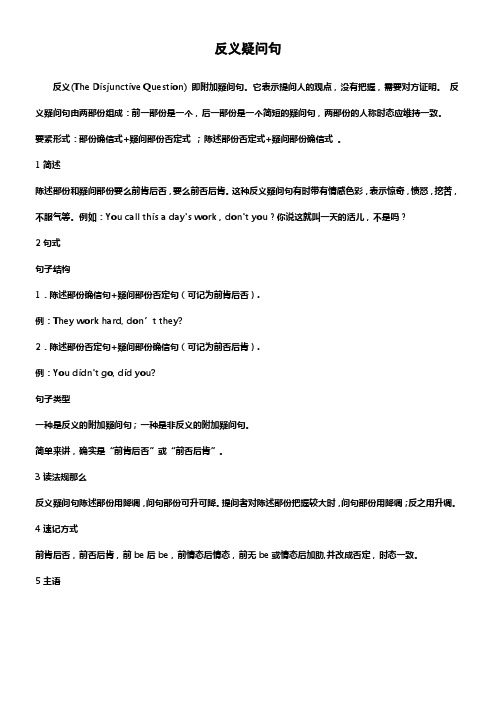
反义疑问句反义(The Disjunctive Question) 即附加疑问句。
它表示提问人的观点,没有把握,需要对方证明。
反义疑问句由两部份组成:前一部份是一个,后一部份是一个简短的疑问句,两部份的人称时态应维持一致。
要紧形式:部份确信式+疑问部份否定式;陈述部份否定式+疑问部份确信式。
1简述陈述部份和疑问部份要么前肯后否,要么前否后肯。
这种反义疑问句有时带有情感色彩,表示惊奇,愤怒,挖苦,不服气等。
例如:You call this a day's work,don't you?你说这就叫一天的活儿,不是吗?2句式句子结构1.陈述部份确信句+疑问部份否定句(可记为前肯后否).例:They work hard, don’t they?2.陈述部份否定句+疑问部份确信句(可记为前否后肯).例:You didn't go, did you?句子类型一种是反义的附加疑问句;一种是非反义的附加疑问句。
简单来讲,确实是“前肯后否”或“前否后肯”。
3读法规那么反义疑问句陈述部份用降调,问句部份可升可降。
提问者对陈述部份把握较大时,问句部份用降调;反之用升调。
4速记方式前肯后否,前否后肯,前be后be,前情态后情态,前无be或情态后加助,并改成否定,时态一致。
5主语一样词语附加疑问句中用和主句一致的主语,用。
附加疑问句侍从句。
不定代词当陈述部份的主语是(1)one时,后面的可用one/he.(2)no one时,后面附加疑问句中主语用they。
(3)everything,anything,nothing,something时,附加疑问句中主语用it 不用they(4)this, that,或those, these时,附加疑问句中主语用it或they.(5)everyone,everybody,someone,somebody,anyone,nobody等时,附加疑问句中主语一样用they(口头语,非正式文体)/he(正式文体)。
反义疑问句的例句

反义疑问句的例句反义疑问句是英语语法中常用的一种疑问句形式。
它由一个陈述句和一个简略的疑问句构成,用于询问对方是否同意或不同意陈述句的内容。
1. He's not going to the party, is he?2. You don't like coffee, do you?3. They won't be late, will they?4. She can swim, can't she?5. He didn't finish his homework, did he?6. You haven't seen the movie, have you?7. She will call you later, won't she?8. He shouldn't eat too much, should he?9. They couldn't find the keys, could they?10. You haven't been to Paris, have you?11. She isn't coming with us, is she?12. You won't forget to pick up the groceries, will you?13. He doesn't know the answer, does he?14. They didn't win the game, did they?15. You can't speak French, can you?16. She hasn't finished her work, has she?17. He will be on time, won't he?18. They shouldn't eat junk food, should they?19. You couldn't find your passport, could you?20. She isn't feeling well today, is she?21. He has never been to Japan, has he?22. You won't be late for the meeting, will you?23. They didn't enjoy the concert, did they?24. She doesn't like spicy food, does she?25. He hasn't watched the movie, has he?26. You will help me with the project, won't you?27. She shouldn't drive in that condition, should she?28. They couldn't solve the problem, could they?29. You haven't finished reading the book, have you?30. She isn't going on vacation, is she?31. He didn't invite her to the party, did he?32. You don't need any help, do you?33. They won't miss the train, will they?34. She can play the piano, can't she?35. He didn't attend the meeting, did he?36. You haven't seen that TV show, have you?37. She will pass the exam, won't she?38. They shouldn't drink alcohol and drive, should they?39. You couldn't find your keys, could you?40. She isn't interested in sports, is she?以上是一些常见的反义疑问句的例句,可以帮助你更好地理解和运用这种语法结构。
(完整)高中英语反义疑问句(详细)

反义疑问句反义疑问句(The Disjunctive Question) 即附加疑问句。
它表示提问人的看法,没有把握,需要对方证实。
反义疑问句由两部分组成:前一部分是一个陈述句,后一部分是一个简短的疑问句,两部分的人称时态应保持一致。
主要形式:陈述部分肯定式+疑问部分否定式;陈述部分否定式+疑问部分肯定式。
1简述陈述部分和疑问部分要么前肯后否,要么前否后肯。
这类反义疑问句有时带有感情色彩,表示惊奇,愤怒,讽刺,不服气等。
例如:You call this a day's work,don't you?你说这就叫一天的活儿,不是吗?2句式句子结构1.陈述部分肯定句+疑问部分否定句(可记为前肯后否).例:They work hard, don’t they?2.陈述部分否定句+疑问部分肯定句(可记为前否后肯).例:You didn't go, did you?句子类型一种是反义的附加疑问句;一种是非反义的附加疑问句。
简单来说,就是“前肯后否”或“前否后肯”。
3读法规则反义疑问句陈述部分用降调,问句部分可升可降。
提问者对陈述部分把握较大时,问句部分用降调;反之用升调。
4速记方法前肯后否,前否后肯,前be后be,前情态后情态,前无be或情态后加助,并改为否定,时态一致。
5主语一般词语附加疑问句中主语用和主句一致的主语,用主格。
附加疑问句随从句。
不定代词当陈述部分的主语是(1)one时,后面的疑问句可用one/he.(2)no one时,后面附加疑问句中主语用they。
(3)everything,anything,nothing,something时,附加疑问句中主语用it 不用they(4)this, that,或those, these时,附加疑问句中主语用it或they.(5)everyone,everybody,someone,somebody,anyone,nobody等时,附加疑问句中主语一般用they (口头语,非正式文体)/he(正式文体)。
反义疑问句的用法归纳及回答举例

反义疑问句的用法归纳及回答举例
1. 哎呀呀,反义疑问句就是在陈述句后面加上一个简短问句呀!比如“你喜欢看书,不是吗?”,这里就是先陈述“你喜欢看书”,然后问“不是吗”。
2. 咱要注意哦,如果前面陈述句是肯定的,后面的反义疑问句就要用否定形式呢。
就像“他很聪明,不是吗?”。
3. 反过来,如果前面是否定陈述句,那后面的反义疑问句就得是肯定的啦!比如“她今天没来,对吧?”。
4. 回答的时候可别糊涂呀!要是同意就说“是呀”或“对呀”,不同意就直接说“不是”。
就好像人家问“今天天气不错,不是吗?”,觉得对就说“是呀”。
5. 有时还会遇到特殊情况呢,像“Let's go shopping,shall we?”这时候就得用“shall we”呀。
6. 还有那种祈使句的反义疑问句呢,“别跑太快,好吗?”就是一种呀。
7. 哎呀,这反义疑问句用法不复杂吧,一学就会啦!就像学骑自行车,掌握了技巧就没问题啦!
8. 记住这些要点,以后再遇到反义疑问句就不怕啦!反义疑问句其实挺好玩的呀,能让我们的交流更有趣不是吗?我觉得掌握反义疑问句真的很有用,能让我们的表达更丰富呢。
反义疑问句规则
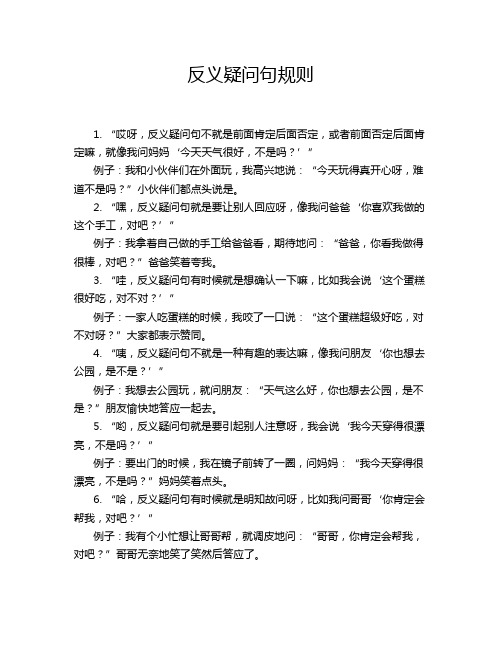
反义疑问句规则1. “哎呀,反义疑问句不就是前面肯定后面否定,或者前面否定后面肯定嘛,就像我问妈妈‘今天天气很好,不是吗?’”例子:我和小伙伴们在外面玩,我高兴地说:“今天玩得真开心呀,难道不是吗?”小伙伴们都点头说是。
2. “嘿,反义疑问句就是要让别人回应呀,像我问爸爸‘你喜欢我做的这个手工,对吧?’”例子:我拿着自己做的手工给爸爸看,期待地问:“爸爸,你看我做得很棒,对吧?”爸爸笑着夸我。
3. “哇,反义疑问句有时候就是想确认一下嘛,比如我会说‘这个蛋糕很好吃,对不对?’”例子:一家人吃蛋糕的时候,我咬了一口说:“这个蛋糕超级好吃,对不对呀?”大家都表示赞同。
4. “咦,反义疑问句不就是一种有趣的表达嘛,像我问朋友‘你也想去公园,是不是?’”例子:我想去公园玩,就问朋友:“天气这么好,你也想去公园,是不是?”朋友愉快地答应一起去。
5. “哟,反义疑问句就是要引起别人注意呀,我会说‘我今天穿得很漂亮,不是吗?’”例子:要出门的时候,我在镜子前转了一圈,问妈妈:“我今天穿得很漂亮,不是吗?”妈妈笑着点头。
6. “哈,反义疑问句有时候就是明知故问呀,比如我问哥哥‘你肯定会帮我,对吧?’”例子:我有个小忙想让哥哥帮,就调皮地问:“哥哥,你肯定会帮我,对吧?”哥哥无奈地笑了笑然后答应了。
7. “呐,反义疑问句就是这样的啦,像我问妹妹‘你也喜欢看动画片,是不是?’”例子:我和妹妹在看电视,我问她:“你也喜欢看动画片,是不是?”妹妹开心地说喜欢。
8. “嘿呀,反义疑问句能让对话更有意思呢,我会说‘你不会不喜欢吃冰淇淋吧?’”例子:我拿着冰淇淋问小伙伴:“这么好吃的冰淇淋,你不会不喜欢吃吧?”小伙伴赶紧说喜欢。
9. “哎呀呀,反义疑问句就是这样特别呀,像我问奶奶‘您最疼我了,对吧?’”例子:我依偎在奶奶身边,撒娇地问:“奶奶,您最疼我了,对吧?”奶奶满脸慈爱地说是。
10. “哇塞,反义疑问句可太有用啦,比如我问同学‘明天要上学,对吧?’”例子:放学的时候,我和同学讨论,我说:“明天要上学,对吧?”同学也说是呀。
反义疑问句例句20个
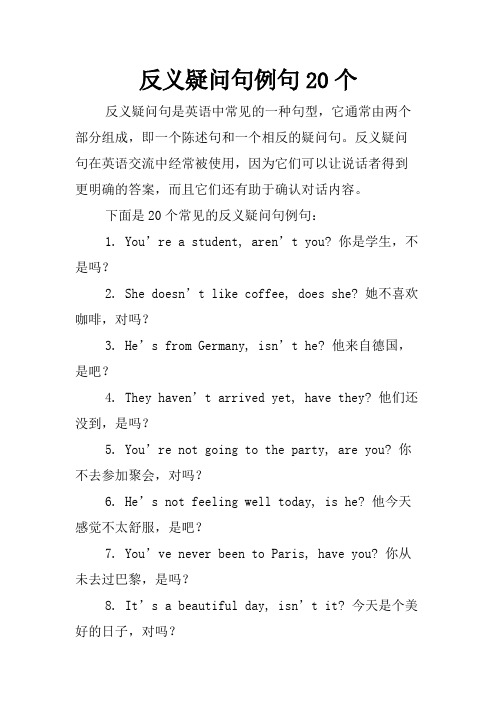
反义疑问句例句20个反义疑问句是英语中常见的一种句型,它通常由两个部分组成,即一个陈述句和一个相反的疑问句。
反义疑问句在英语交流中经常被使用,因为它们可以让说话者得到更明确的答案,而且它们还有助于确认对话内容。
下面是20个常见的反义疑问句例句:1. You’re a student, aren’t you? 你是学生,不是吗?2. She doesn’t like coffee, does she? 她不喜欢咖啡,对吗?3. He’s from Germany, isn’t he? 他来自德国,是吧?4. They haven’t arrived yet, have they? 他们还没到,是吗?5. You’re not going to the party, are you? 你不去参加聚会,对吗?6. He’s not feeling well today, is he? 他今天感觉不太舒服,是吧?7. You’ve never been to Paris, have you? 你从未去过巴黎,是吗?8. It’s a beautiful day, isn’t it? 今天是个美好的日子,对吗?9. He can’t swim, can he? 他不会游泳,对吗?10. She doesn’t like pizza, does she? 她不喜欢披萨,对吗?11. You’re not afraid of heights, are you? 你不怕高,对吗?12. They won’t be able to attend the meeting, will they? 他们不能参加会议,对吗?13. They’re leaving tomorrow, aren’t they? 他们明天要走了,对吗?14. He’s never been skiing, has he? 他从未滑过雪,对吗?15. She’s not going to the concert, is she? 她不去音乐会,对吗?16. You’re not worried about the exam, are you? 你不担心考试吧,对吗?17. He didn’t eat breakfast this morning, did he? 他今天早上没吃早餐,对吗?18. They’r e not going to the beach, are they? 他们不去海边,对吗?19. You’ve already seen the movie, haven’t you? 你已经看过这部电影了,对吗?20. He’s not coming to the party, is he? 他不来参加聚会,对吗?在使用反义疑问句时,需要注意的是,它们并不总是表示对话者的不确定或疑虑。
反义疑问句的句型

反义疑问句的句型
1. 你知道“今天天气真好,不是吗?”这就是一个反义疑问句呀!比如大家一起出去玩,有人说“这地方真好玩啊”,然后接着来一句“不是吗”,是不是感觉很自然?
2. 难道你没听过“他很厉害,对吧?”这种句子吗?就像朋友在你面前展示一项技能,然后问你“我厉害吧,对吧?”。
3. “你应该会做饭,不是吗?”,这太常见啦!就像妈妈问孩子“你都这么大了,应该会做饭,不是吗?”。
4. 有没有觉得“那本书很有趣,不是吗?”这样的反义疑问句很亲切?比如在读书分享会上,有人推荐一本书后说“那本书真的很有趣,不是吗?”。
5. “你喜欢这部电影,对吧?”,哎呀,这不就是我们平时会说的嘛!像和朋友看完电影后会问“你喜欢这部电影,对吧?”。
6. “这件衣服很漂亮,不是吗?”多形象啊!比如在服装店试衣服,自己会说“这件衣服很漂亮,不是吗?”。
7. “你不会生气了吧,不是吗?”,这种时候常常会这么问呀!就像和朋友开玩笑后担心他生气,就会问一句“你不会生气了吧,不是吗?”。
8. “这个蛋糕很好吃,对吧?”,想想在吃蛋糕的时候,是不是很容易就说出这句话呢!
9. “他肯定能做好,不是吗?”,就好像对别人充满信心时会说“他那么厉害,肯定能做好,不是吗?”。
10. “你已经准备好了,对吧?”,比如要去参加一个活动,会问伙伴“你已经准备好了,对吧?”。
我的观点结论:反义疑问句在我们的日常交流中真的太常见啦,它能让对话更自然、更亲切,也能更好地表达我们的情感和态度。
反义疑问句归纳整理
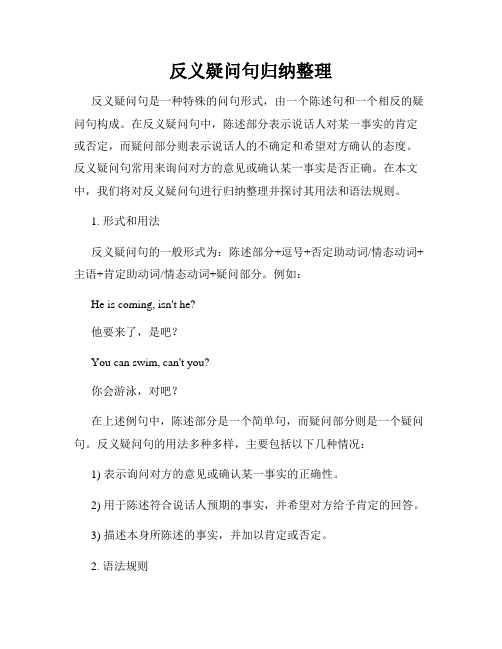
反义疑问句归纳整理反义疑问句是一种特殊的问句形式,由一个陈述句和一个相反的疑问句构成。
在反义疑问句中,陈述部分表示说话人对某一事实的肯定或否定,而疑问部分则表示说话人的不确定和希望对方确认的态度。
反义疑问句常用来询问对方的意见或确认某一事实是否正确。
在本文中,我们将对反义疑问句进行归纳整理并探讨其用法和语法规则。
1. 形式和用法反义疑问句的一般形式为:陈述部分+逗号+否定助动词/情态动词+主语+肯定助动词/情态动词+疑问部分。
例如:He is coming, isn't he?他要来了,是吧?You can swim, can't you?你会游泳,对吧?在上述例句中,陈述部分是一个简单句,而疑问部分则是一个疑问句。
反义疑问句的用法多种多样,主要包括以下几种情况:1) 表示询问对方的意见或确认某一事实的正确性。
2) 用于陈述符合说话人预期的事实,并希望对方给予肯定的回答。
3) 描述本身所陈述的事实,并加以肯定或否定。
2. 语法规则在构成反义疑问句的过程中,需要遵循一些语法规则,以确保句子的正确性和逻辑性。
2.1 句子主语在反义疑问句中,疑问部分的主语通常与陈述部分一致。
例如:She likes ice cream, doesn't she?她喜欢冰淇淋,对吧?You have finished your homework, haven't you?你完成了作业,是吧?2.2 肯定和否定疑问部分的肯定或否定助动词/情态动词取决于陈述部分的肯定或否定。
如果陈述部分是肯定的,疑问部分的助动词/情态动词是否定形式,反之亦然。
例如:He doesn't like chocolate, does he?他不喜欢巧克力,对吧?They can't swim, can they?他们不会游泳,是吧?2.3 时态和语态反义疑问句的时态和语态一般与陈述部分保持一致。
例如:She has been to Paris, hasn't she?她去过巴黎,是吧?The book wasn't written by him, was it?这本书不是他写的,对吧?3. 总结反义疑问句是一种特殊的问句形式,常用来询问对方的意见或确认某一事实的正确性。
反义疑问句知识点总结全面
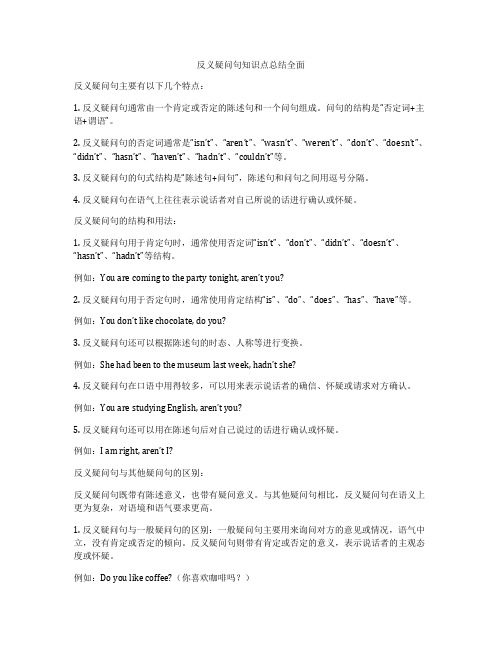
反义疑问句知识点总结全面反义疑问句主要有以下几个特点:1. 反义疑问句通常由一个肯定或否定的陈述句和一个问句组成。
问句的结构是“否定词+主语+谓语”。
2. 反义疑问句的否定词通常是“isn’t”、“aren’t”、“wasn’t”、“weren’t”、“don’t”、“doesn’t”、“didn’t”、“hasn’t”、“haven’t”、“hadn’t”、“couldn’t”等。
3. 反义疑问句的句式结构是“陈述句+问句”,陈述句和问句之间用逗号分隔。
4. 反义疑问句在语气上往往表示说话者对自己所说的话进行确认或怀疑。
反义疑问句的结构和用法:1. 反义疑问句用于肯定句时,通常使用否定词“isn’t”、“don’t”、“didn’t”、“doesn’t”、“hasn’t”、“hadn’t”等结构。
例如:You are coming to the party tonight, aren’t you?2. 反义疑问句用于否定句时,通常使用肯定结构“is”、“do”、“does”、“has”、“have”等。
例如:You don’t like chocola te, do you?3. 反义疑问句还可以根据陈述句的时态、人称等进行变换。
例如:She had been to the museum last week, hadn’t she?4. 反义疑问句在口语中用得较多,可以用来表示说话者的确信、怀疑或请求对方确认。
例如:You are studying English, aren’t you?5. 反义疑问句还可以用在陈述句后对自己说过的话进行确认或怀疑。
例如:I am right, aren’t I?反义疑问句与其他疑问句的区别:反义疑问句既带有陈述意义,也带有疑问意义。
与其他疑问句相比,反义疑问句在语义上更为复杂,对语境和语气要求更高。
1. 反义疑问句与一般疑问句的区别:一般疑问句主要用来询问对方的意见或情况,语气中立,没有肯定或否定的倾向。
反义疑问句归纳

反疑句整理一、反意疑句中句局部的与述局部的在气上成相反的关系,即:一定 +否定否定 +一定如:①You can’t do it, can you ②They are very late for the meeting,aren ’t they二、反意疑句中句局部的与述局部的种要一致。
如:①He has supper at home every day, doesn’t he (不可以用hasn’t he)②They have known the matter, haven’t they (不可以用don’t they)三、反意疑句中句局部的在上和述局部的一致。
如:①They will go to town soon, won’t they( 不可以用 don’t they 或 aren ’t they)②He works very hard, doesn’t he(不可以用 didn ’t he或 won’ t he)四、反意疑句的述局部含有由 un-, im-, in-, dis-,等否定意的前组成的,述局部要一定含,句局部用否定形式。
如:①Your father is unhappy, isn’t he( 不可以用 is he)②The man is dishonest, isn’t he (不可以用 is he)③It is impossible to learn English without remembering more words, isn ’t it(不可以用 is it )五、反意疑句的述局部有little, few, never, hardly, seldom等否定意的,句局部用一定式。
如:不用 doesn’t she)①She never tells a lie, does she(②He was seldom late, was he(不用 wasn’t he)六、反意疑句的述局部I am ⋯⋯,句局部上用aren ’t I表示。
反义疑问句句型归纳

反义疑问句句型归纳1、You had no time for reading, did you ? \ had you?2、He has a brother, hasn’t he, \ doesn’t he?3、We have to go without him, don’t we ?4、You have your dinner at school, don’t you?5、He has a rest every two hours, doesn’t he?6、This is your last chance to learn from the beginning, isn’t it?7、Those were terrible days for us to recall, weren’t they?8、There are some books you are interested in, aren’t there?9、Let us do it as we please \ like to, will you? \ can you?10、Let’s us do it right now, shall we? \ can we?11、Come here, will you? \ won’t you \ can you \ can’t you \ do you \ don’t you?12、Don’t say anything, will you? \ can you? \ do you?13、Tom, you clean the window, will you?14、I think \ say \suppose \ guess \ am sure he will come back soon, won’t he?15、I don’t think he will come back , will he?16、He old man never thought he was lonely, did he?17、The old man used to be a farmer, usedn’t he \ didn’t he?18、He ought to come, oughtn’t he \ shouldn’t?19、He seldom goes to the cinema, doesn’t he?( hardly, never, few, little, nothing, nobody)20、It’s unfair, isn’t it?21、One can’t be careful enough, can one \ can he?22、Everything goes well, doesn’t it?23、Everybody agrees with him, doesn’t he \ don’t they?24、All we needed has been bought, hasn’t it?25、All we invited have arrived, haven’t they?(All refers to people)26、Learning English is very hard, isn’t it?27、He studies hard and he is often praised by his teachers, isn’t he?28、We must be more polite in this occasion, needn’t we?29、He must be a brave man, isn’t he?30、It must have rained last night, didn’t it?31、He mush have known the answer, hasn’t he?32、He can’t have done such a foolish thing, has he?33、I am a student, aren’t I ?34、So he has known the secret, has he?35、Oh, you have the same type of sell phone as I, do you?。
反义疑问句(含解析、例句及详尽用法)
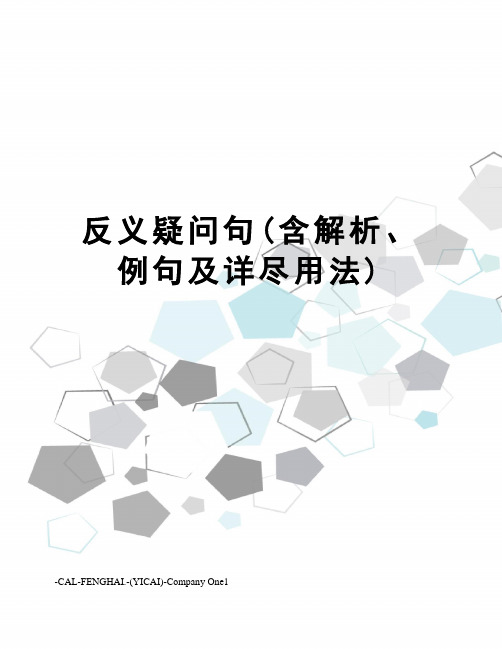
反义疑问句(含解析、例句及详尽用法)-CAL-FENGHAI.-(YICAI)-Company One1反义疑问句一、祈使句的反义疑问句1、肯定祈使句Will you/won’t you2、否定祈使句Will you3、Let的祈使句Let us ...,will you(此处Let us 表示“允许我们...”)Let’s...,shall we (此处Let’s表示“让我们...吧”)Let + 第三人称...,will you二、Must的反义疑问句1、表示“必须” musn’t /needn’tEg. You must go now, needn’t you2、表示“不准”Eg. You musn’t smoke here, must/may you3、表示推测,肯定。
(I’m sure + 从句)Eg. You must be hungry now, aren’t youI’m sure you are hungry now, aren’t youShe must have heard about that, hasn’t sheI’m sure you have heard about that, haven’t youYou must have watched that movie last night, didn’t you(last nigh为具体时间点,所以用一般过去式)三、主语(反义疑问句)+从句主句:I(don’t)think/believe/consider/suppose 或 I’m afraid/sure...后跟从句时,可将从句部分进行反义疑问Eg. I don’t think he will win, will heI think he will win, won’t heShe thinks he will win, doesn’t she(当主句主语不是I时不适用于该用法,此句中的翻译疑问针对的是主句而非从句)四、当句中包含有表示否定意义的副词或不定代词时,反义疑问句用肯定形式Eg. Nothing happened to him, did itIt is unfair, isn’t itHe dislikes watching TV, doesn’t he(该句中含否定意义的是动词而非副词或不定代词,因此不适用于该用法,反义疑问句仍然使用否定形式)五、反义疑问句的回答反义疑问句的回答针对被提问部分的谓语动词,且与回答句前部分的Yes和No 保持一致Eg. A: You haven’t lost the ticket, have youB: D I know it’s hard to get another one at this moment.A. Yes, I haven’tB. No, I haveC. I hope soD. I’m afraid not六、陈述部分的主语与反义疑问句主语保持一致的情况1、OneEg. One can’t be too careful when driving a car, can one/he一个人在开车的时候再怎么小心也不为过。
十八种特殊的反义疑问句

英语18种特殊的反意疑问句1.祈使句。
祈使句后一般加上will you或won't you构成反意疑问句,用will you 多表示“请求”,用won't you 多表示提醒对方注意。
例如:Look at the blackboard, will you/ won't you?看黑板,好吗?Let引导的祈使句有两种情况:1)Let's...,后的反意疑问句用shall we或shan't we。
例如:Let's go home, shall we/ shan't we? 回家吧,好吗?还可以用may I来表示征求对方的同意或许可。
2)Let us/me...后的反意疑问句用will you或won't you。
例如:Let me have a try, will you/won't you? 让我试一试,行吗?2.感叹句。
感叹句后加反意疑问句时,其反意疑问句需用be的一般现在时态的否定形式。
例如:What fine weather, isn't it? 多好的天气啊,是吧?3. 当陈述部分谓语动词是need, dare, used to,且这些词被用作实义动词时,其反意疑问句需用do的适当形式。
例如:He needs help, doesn't he?他需要帮助,是吗?4.陈述部分主、谓语是I am...时,反意疑问句用aren't I 或am't I ,而不是am notI (可用am I not)。
例如:I'm working now, am't I? 我在工作,是吗?5.陈述部分的主语是everything, nothing, anything或something 时,反意疑问句的主语应用代词it。
例如:Something is wrong with my radio, isn't it? 我的收音机出毛病了,是吧?6.陈述部分的主语是everybody, everyone, anybody, anyone, somebody, someone, nobody, no one, none, neither 时, 其反意疑问句的主语需用复数代词they。
简明反义疑问句归纳

7
have用在完成时中
用have
8
有little, few, never, hardly, seldom,nobody, nothing, no one, none, neither等否定意义的词时,
肯定式
9
有un, dis-前缀、less-后缀等含有词缀而意思否定的词),当做肯定句处理,
用否定结构。
17
当must+do用来表示对现 在的情况进行推测时,
根据do采用相应的形式。
18
need实义动词
do
19
need情态动词
need
20
let’s引导,
shall we
21
let us/me引导 和否定祈使句,
will you
22
肯定祈使句
will you 或won’t you 都行
23
主从复合句时
主语常与主句主语一致
反义疑问句用法归纳详解
序号
陈述句(谓语部分)
附加问句
1
肯/否
否/肯+主语
2
be动词、助动词、情态动词时,肯/否
be动词,助动词,或是情态动肯/否+主语
3
have 表“有”时
have/do
4
have表“吃,喝,玩,度过,举办”等时候,
用do
5
have to表“不得不,必须”时
用do
6
had better表“最好”时
24
主语为I/We,谓语动词是think, believe, imagine, expect等时
主语常与从句主语一致,并注意否定前移。
主语用he或 they,这时问句动词的数应和he或 they一致。
反意疑问句的用法归纳及回答举例

反意疑问句的用法归纳及回答举例
1. 哎呀呀,反意疑问句就是先陈述一个事实,然后加上一个相反的疑问呀!比如说“今天天气不错,不是吗?”这就是个典型例子嘛!大家想想是不是这样呀!
2. 嘿,你们知道吗,反意疑问句有时候是一种确认呢!就像“你喜欢吃苹果,对吧?”这其实就是在确认对方是不是真的喜欢呀!是不是很好玩呢!
3. 哇塞,反意疑问句还可以用来表示强调呢!像“他肯定知道答案,难道不是吗?”这样说就能加重肯定的语气哟!大家平时有没有这么用过呀!
4. 哈哈,反意疑问句也能让对话更生动呢!比如“你做完作业啦,没骗我吧?”是不是感觉瞬间对话就有趣起来了呢!
5. 哎哟喂,反意疑问句还能表达惊讶呢!像“你竟然没听说过,不会吧?”这就把那种惊讶的情绪传达出来啦!大家觉得妙不妙呀!
6. 嘿嘿,反意疑问句在很多时候都超有用的呀!比如“这个电影很好看,你也这么觉得,对吧?”这能快速和别人找到共鸣呢!
我觉得反意疑问句真的是一种很有趣又实用的语言形式呢,大家一定要好好掌握呀!。
简要总结反意疑问句19条
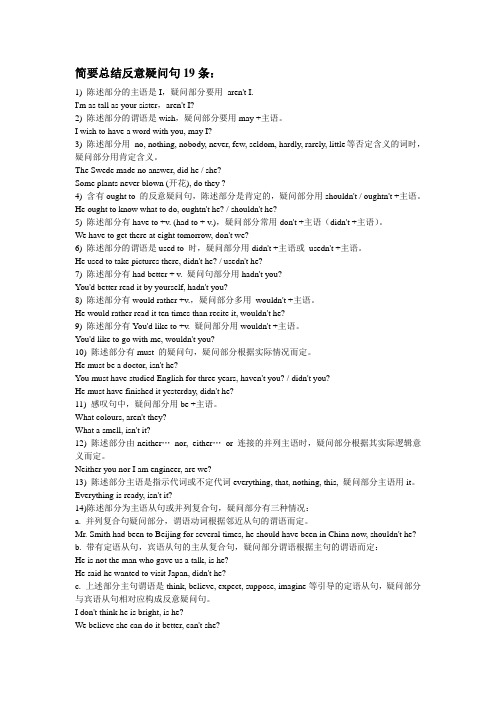
简要总结反意疑问句19条:1) 陈述部分的主语是I,疑问部分要用aren't I.I'm as tall as your sister,aren't I?2) 陈述部分的谓语是wish,疑问部分要用may +主语。
I wish to have a word with you, may I?3) 陈述部分用no, nothing, nobody, never, few, seldom, hardly, rarely, little等否定含义的词时,疑问部分用肯定含义。
The Swede made no answer, did he / she?Some plants never blown (开花), do they ?4) 含有ought to 的反意疑问句,陈述部分是肯定的,疑问部分用shouldn't / oughtn't +主语。
He ought to know what to do, oughtn't he? / shouldn't he?5) 陈述部分有have to +v. (had to + v.),疑问部分常用don't +主语(didn't +主语)。
We have to get there at eight tomorrow, don't we?6) 陈述部分的谓语是used to 时,疑问部分用didn't +主语或usedn't +主语。
He used to take pictures there, didn't he? / usedn't he?7) 陈述部分有had better + v. 疑问句部分用hadn't you?You'd better read it by yourself, hadn't you?8) 陈述部分有would rather +v.,疑问部分多用wouldn't +主语。
反义疑问句句式

反义疑问句句式
1. 你知道吗,今天天气真好,不是吗?就像阳光照亮了整个世界一样,能让人心情超好,对吧!比如:“哇,今天这大晴天,出去逛逛多好啊,不是吗?”
2. 他真的很努力工作,不是吗?就如同勤劳的小蜜蜂一样,一直在忙碌,对吧!像这样:“他每天都那么拼命,真的很努力工作,不是吗?”
3. 她笑起来真好看,不是吗?简直像春天盛开的花朵一样迷人,对吧!比如:“你看她笑起来的样子,真好看,不是吗?”
4. 这道菜味道很棒,不是吗?就跟顶级大厨做的一样,对吧!像:“哇,这道菜味道太棒了,不是吗?”
5. 他说话很有趣,不是吗?就好像一个幽默大师一样,能把人逗笑,对吧!例如:“听听他说话,多有趣啊,不是吗?”
6. 那部电影超好看,不是吗?如同一场视觉盛宴,对吧!像这样:“哇,那部电影简直超好看,不是吗?”
7. 她唱歌很好听,不是吗?仿佛天籁之音一般,对吧!比如:“哇,她唱歌真的很好听,不是吗?”
8. 这个地方很热闹,不是吗?好似欢乐的海洋,对吧!例如:“看,这个地方这么热闹,不是吗?”
9. 他很聪明,不是吗?就跟天才似的,对吧!像:“这家伙脑子真好
用,很聪明,不是吗?”
10. 这件事很简单,不是吗?就跟吃饭一样容易,对吧!比如:“哎呀,这件事很简单啦,不是吗?”
我的观点结论:反义疑问句句式真的很有趣,可以在各种情境中使用,让表达更丰富、更有感染力!。
反义疑问句归纳整理

反义疑问句归纳整理一、反意疑问句中问句部分的动词与陈述部分的动词在语气上成相反的对应关系,即:肯定+否定?否定+肯定?如:①You can’t do it, can you? ②They are very late for the meeting, aren’t they?二、反意疑问句中问句部分的动词与陈述部分的动词种类要对应一致。
如:①He has supper at home every day, doesn’t he? (不能用hasn’t he?)②They have known the matter, haven’t they? (不能用don’t they?)三、反意疑问句中问句部分的动词在时态上应和陈述部分的时态一致。
如:①They will go to town soon, won’t they?(不能用don’t they?或 aren’t they?)②He works very hard, doesn’t he?(不能用didn’t he?或won’t he?)四、反意疑问句的陈述部分含有由un-, im-, in-, dis-, 等否定意义的前缀构成的词语时,陈述部分要视为肯定含义,问句部分用否定形式。
如:①Your father is unhappy, isn’t he?(不能用is he?)②The man is dishonest, isn’t he? (不能用is he?)③It is impossible to learn English without remembering more words, isn’t it?(不能用is it ?)五、反意疑问句的陈述部分带有little, few, never, hardly, seldom等否定意义的词时,问句部分用肯定式。
如:①She never tells a lie, does she?(不用doesn’t she?)②He was seldom late, was he?(不用wasn’t he?)六、反意疑问句的陈述部分为I am……时,问句部分习惯上用aren’t I?表示。
- 1、下载文档前请自行甄别文档内容的完整性,平台不提供额外的编辑、内容补充、找答案等附加服务。
- 2、"仅部分预览"的文档,不可在线预览部分如存在完整性等问题,可反馈申请退款(可完整预览的文档不适用该条件!)。
- 3、如文档侵犯您的权益,请联系客服反馈,我们会尽快为您处理(人工客服工作时间:9:00-18:30)。
简要总结反意疑问句19条:
1) 陈述部分的主语是I,疑问部分要用aren't I.
I'm as tall as your sister,aren't I?
2) 陈述部分的谓语是wish,疑问部分要用may +主语。
I wish to have a word with you, may I?
3) 陈述部分用no, nothing, nobody, never, few, seldom, hardly, rarely, little等否定含义的词时,疑问部分用肯定含义。
The Swede made no answer, did he / she?
Some plants never blown (开花), do they ?
4) 含有ought to 的反意疑问句,陈述部分是肯定的,疑问部分用shouldn't / oughtn't +主语。
He ought to know what to do, oughtn't he? / shouldn't he?
5) 陈述部分有have to +v. (had to + v.),疑问部分常用don't +主语(didn't +主语)。
We have to get there at eight tomorrow, don't we?
6) 陈述部分的谓语是used to 时,疑问部分用didn't +主语或usedn't +主语。
He used to take pictures there, didn't he? / usedn't he?
7) 陈述部分有had better + v. 疑问句部分用hadn't you?
You'd better read it by yourself, hadn't you?
8) 陈述部分有would rather +v.,疑问部分多用wouldn't +主语。
He would rather read it ten times than recite it, wouldn't he?
9) 陈述部分有You'd like to +v. 疑问部分用wouldn't +主语。
You'd like to go with me, wouldn't you?
10) 陈述部分有must 的疑问句,疑问部分根据实际情况而定。
He must be a doctor, isn't he?
You must have studied English for three years, haven't you? / didn't you?
He must have finished it yesterday, didn't he?
11) 感叹句中,疑问部分用用否定的助动词加sb/sth?如:
1)What a fine day it is today!
What a fine day it is today,isn“t it?
2)How fast he runs!
How fast he runs,doesn”t he?
3)What a long time we have been waiting!
What a long time we have been waiting ,haven“t we?
12) 陈述部分由neither… nor, either… or 连接的并列主语时,疑问部分根据其实际逻辑意义而定。
Neither you nor I am engineer, are we?
13) 陈述部分主语是指示代词或不定代词everything, that, nothing, this, 疑问部分主语用it。
Everything is ready, isn't it?
14)陈述部分为主语从句或并列复合句,疑问部分有三种情况:
a. 并列复合句疑问部分,谓语动词根据邻近从句的谓语而定。
Mr. Smith had been to Beijing for several times, he should have been in China now, shouldn't he?
b. 带有定语从句,宾语从句的主从复合句,疑问部分谓语根据主句的谓语而定:
He is not the man who gave us a talk, is he?
He said he wanted to visit Japan, didn't he?
c. 上述部分主句谓语是think, believe, expect, suppose, imagine等引导的定语从句,疑问部分与宾语从句相对应构成反意疑问句。
I don't think he is bright, is he?
We believe she can do it better, can't she?
15) 陈述部分主语是不定代词everybody, anyone, somebody, nobody, no one等,疑问部分常用复数they,有时也用单数he。
Everyone knows the answer, don't they? (does he?)
Nobody knows about it, do they? (does he?)
16) 带情态动词dare或need的反意疑问句,疑问部分常用need (dare ) +主语。
We need not do it again, need we ?
He dare not say so, dare you?
当dare, need 为实义动词时,疑问部分用助动词do + 主语。
She doesn't dare to go home alone, does she?
17) 省去主语的祈使句的反意疑问句,疑问部分用will you。
Don't do that again, will you?
Go with me, will you / won't you ?
注意:Let's 开头的祈使句,后用shall we?
Let us 开头的祈使句,后用will you?
Let's go and listen to the music, shall we?
Let us wait for you in the reading-room, will you ?
18) 陈述部分是"there be"结构的,疑问部分用there省略主语代词。
There is something wrong with your watch, isn't there?
There will not be any trouble, will there?
19) 否定前缀不能视为否定词,其反意疑问句仍用否定形式。
It is impossible, isn't it?
He is not unkind to his classmates, is he?
有些动词如:cost hurt hit put 等,它们的过去时与原型相同,在肯定句中一定要先弄清楚它们是什么时态:20)The skirt made of silk cost you a lot of money,()?。
